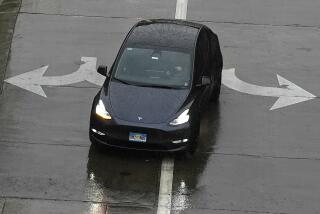Hybrid vehicle momentum stalls
Nowhere do automakers sell more hybrid vehicles than California, with its unique combination of environmental consciousness, high gas prices and traffic-choked highways.
But new hybrid models will be in short supply at this week’s Los Angeles Auto Show — one sign that the technology is still struggling to break out of its green-car niche, experts say.
Although the pioneering Toyota Prius has been the bestselling car in California for two years and still sells well nationally, market share for all hybrids appears to have hit a wall at about 3% of all cars sold. The share hasn’t increased in two years.
“We’re looking at a segment that has stagnated,” said Jeremy Acevedo, senior analyst at auto research firm Edmunds. “It’s more noticeable because the segment had such lofty expectations. It was supposed to be the vehicle of the future.”
It’s not for lack of effort. A total of 27 automakers have introduced at least 44 hybrid versions of often hot-selling mainstream vehicles, including America’s bestselling passenger sedans, the Toyota Camry and Honda Accord, and a number of popular sport utility vehicles. (Globally, Toyota alone has put 23 hybrid models on the road since introducing the first Prius.)
“We’re seeing an expanding model lineup without any expanding market share,” Acevedo said. “That has to be of great concern to these manufacturers.”
Some of the reasons are familiar. Hybrids are still more expensive than traditional gas-powered cars. A 2015 Honda Accord sedan starts at $22,925. The hybrid version is $30,125. A 2015 Toyota Camry LE costs $23,795. The LE hybrid goes for $27,615.
And their sales have traditionally suffered during periods of stable or declining gas prices.
But the biggest factor may be competition from gas-powered cars that have increased their fuel efficiency faster than hybrids — in short, they are catching up. The Prius’ once eye-popping fuel economy rating of 50 mpg looks less dramatic when the latest Honda Fit, Toyota Corolla or Ford Fiesta can top 40 mpg in highway driving.
Toyota’s least expensive Prius liftback, which comes well-equipped, starts at $25,025. The smaller, more stripped-down Prius C starts at $19,905.
The least expensive Honda Fit starts at $16,470.
“Hybrids have always been a tough sell, because of their increased cost,” said Karl Brauer, senior analyst at Kelley Blue Book. “When you have gas prices dropping, it makes it a tougher sell from a fuel efficiency point of view. You can sell the environmental angle, but for most people there has to be a concern about gas prices.”
Hybrids could get a big boost, however, from increasing federal concern about fuel economy. By 2025, automakers will have to hit an average window sticker rating of about 40 mpg across their model lineups to meet federal standards, a feat that will be hard to accomplish without hybrid technology.
Recent fuel-economy improvements in conventional cars have come from updated engines, transmissions and weight savings, but those strategies will produce more limited gains in the future. That could push automakers to find ways to increase sales of hybrids, along with plug-in hybrids, electric vehicles and hydrogen fuel cell vehicles.
But attracting buyers will require cutting the price — no easy trick, with the high costs of designing and building these cutting-edge cars.
In years past, the L.A. Auto Show has been a popular showcase for all manner of green vehicles. Last year, Toyota unveiled redesigned Camry and Highlander hybrids. Hyundai introduced a hybrid Elantra.
At this year’s show, which opens to the media Tuesday and to the public Friday, the hybrid offerings are expected to be limited to three plug-in hybrids, from Volvo, Mercedes and Cadillac.
But plug-ins, which can run a limited distance on battery power alone, cost thousands of dollars more than standard hybrids and sell in tiny volumes. Electric cars and plug-in hybrids together account for less than 1% of all car sales.
Automakers had high hopes for standard hybrids, which are closest to gasoline cars in both cost and ease of operation. Ford is among the companies that have made major investments in manufacturing and marketing hybrid cars, including the Fusion hybrid sedan and C-Max hybrid hatchback, a direct competitor to the Prius.
“It is a bit interesting that the segment has not grown, given the number of entrants that have come into the marketplace,” conceded Garett Carr, electrification marketing manager for Ford. “It’s less than any of us would have predicted.”
The technology needs a jolt of innovation or increased fuel economy if automakers hope to boost sales, experts say.
“It’s smoldering,” said Tom Turrentine, a director of the Institute of Transportation Studies at UC Davis. “It’s a small part of the U.S. market, and it’s not growing.”
If any automaker can push hybrids to a new level of consumer acceptance, it’s Toyota. Since introducing the Prius in 2001, the company has sold 1.7 million hybrids in the U.S., almost 1.5 million of them the original Prius liftback model.
Four out of 10 hybrids on the road in the U.S. bear the Prius name, the company said. Toyota has said it would eventually offer hybrid versions of all its passenger cars.
Some analysts say the company may have gone too far out on the hybrid limb, particularly given the surging efficiency of standard gasoline cars.
“Toyota is really feeling the heat,” Turrentine said. “They’re committed to this pathway. But the difference between the Prius and other vehicles is narrowing.”
Toyota declined to discuss specifics of its anticipated 2016 launch of a redesigned Prius, but company officers have said that the next generation would have a more powerful battery and a more efficient engine, with as much as 10% better fuel economy.
Edmunds senior analyst John O’Dell said the new vehicle would also have more passenger room and more cargo space, and look less like a hybrid and more like a sedan.
“This is an important, even critical, vehicle for Toyota,” O’Dell said. “They hope it can appeal to a new kind of buyer, and a broader audience.”
The company’s regional marketing manager, Doug Coleman, despite the low market share for hybrid cars, dismissed the idea that Toyota might rethink its commitment to hybrids.
“Toyota is fully invested in this technology,” Coleman said. “We’re in this for the long run.”
charles.fleming@latimes.com
Twitter: @misterfleming







